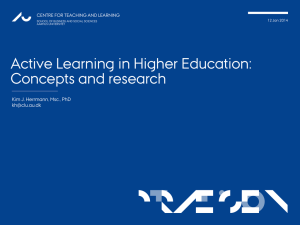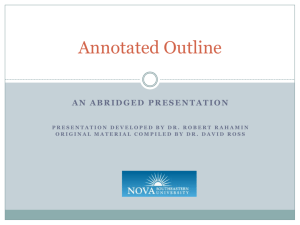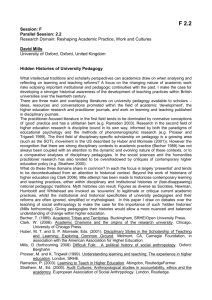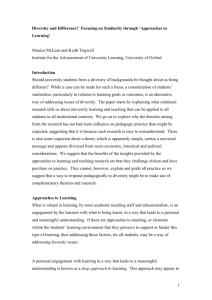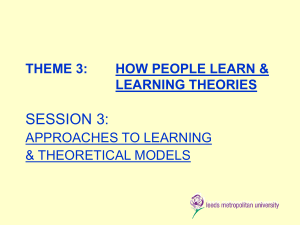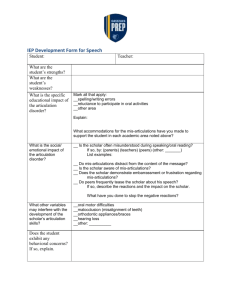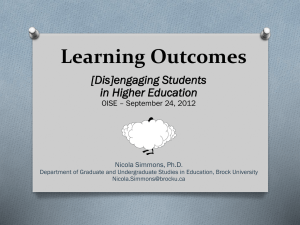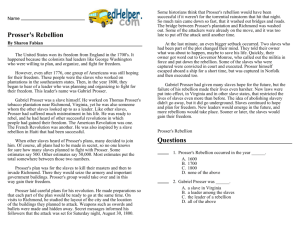ELTI Research Collaborative
advertisement
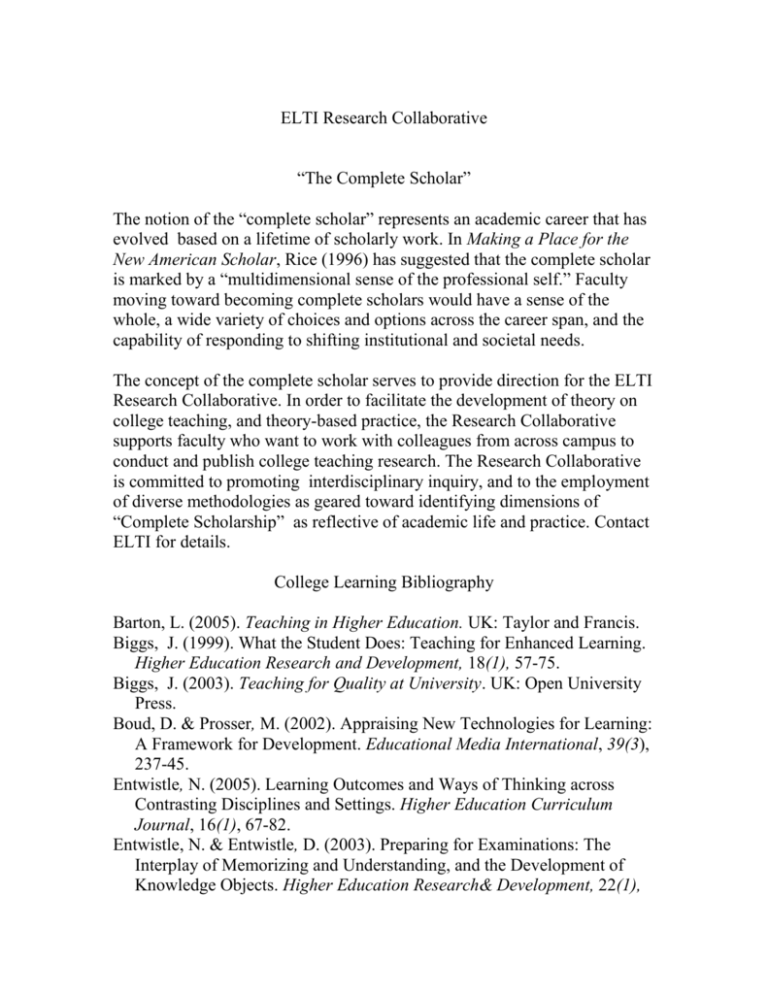
ELTI Research Collaborative “The Complete Scholar” The notion of the “complete scholar” represents an academic career that has evolved based on a lifetime of scholarly work. In Making a Place for the New American Scholar, Rice (1996) has suggested that the complete scholar is marked by a “multidimensional sense of the professional self.” Faculty moving toward becoming complete scholars would have a sense of the whole, a wide variety of choices and options across the career span, and the capability of responding to shifting institutional and societal needs. The concept of the complete scholar serves to provide direction for the ELTI Research Collaborative. In order to facilitate the development of theory on college teaching, and theory-based practice, the Research Collaborative supports faculty who want to work with colleagues from across campus to conduct and publish college teaching research. The Research Collaborative is committed to promoting interdisciplinary inquiry, and to the employment of diverse methodologies as geared toward identifying dimensions of “Complete Scholarship” as reflective of academic life and practice. Contact ELTI for details. College Learning Bibliography Barton, L. (2005). Teaching in Higher Education. UK: Taylor and Francis. Biggs, J. (1999). What the Student Does: Teaching for Enhanced Learning. Higher Education Research and Development, 18(1), 57-75. Biggs, J. (2003). Teaching for Quality at University. UK: Open University Press. Boud, D. & Prosser, M. (2002). Appraising New Technologies for Learning: A Framework for Development. Educational Media International, 39(3), 237-45. Entwistle, N. (2005). Learning Outcomes and Ways of Thinking across Contrasting Disciplines and Settings. Higher Education Curriculum Journal, 16(1), 67-82. Entwistle, N. & Entwistle, D. (2003). Preparing for Examinations: The Interplay of Memorizing and Understanding, and the Development of Knowledge Objects. Higher Education Research& Development, 22(1), 19-41. Entwistle, N. & Walker, P.(2000). Strategic Alertness and Expanded Awareness within Sophisticated Conceptions of Teaching. Instructional Science, 28(5-6), 335-61. Entwistle, N., Skinner, D., Entwistle, D. & Orr, S. (2000). Conceptions and Beliefs about "Good Teaching": An Integration of Contrasting Research Areas. Higher Education Research and Development, 19(1), 5-26. Kember, D. & Leung, D. Y. P. (2005). The Influence of Active Learning Experiences on the Development of Graduate Capabilities. Studies in Higher Education, 30(2), 155-170. Kember, D. (2004). Interpreting Student Workload and the Factors Which Shape Students' Perceptions of Their Workload Studies. Higher Education, 29(2), 165-184. Kember, D., Jenkins, W., Ng, K. C. (2004). Adult Students' Perceptions of Good Teaching as a Function of Their Conceptions of Learning--Part 2. Implications for the Evaluation of Teaching Studies. Continuing Education, 26(1), 81-97. Kember, D., Lee, K., & Li, N. (2002). Cultivating a Sense of Belonging in Part-Time Students. International Journal of Lifelong Education, 20(4), 326-41. Kember, D. (2001). Beliefs about Knowledge and the Process of Teaching and Learning as a Factor in Adjusting To Study. Higher Education, 26(2), 205-21. Kember, D. & Kwan, K. P. (2000). Lecturers' Approaches To Teaching and Their Relationship to Conceptions of Good Teaching. Instructional Science, 28(5), 469-90. Kember, D. & Wong, A. (2000). Implications for Evaluation from a Study of Students' Perceptions of Good and Poor Teaching. Higher Education, 40(1), 69-97. Leung, D. Y. P. & Kember, D. (2003). The Relationship between Approaches to Learning and Reflection upon Practice. Educational Psychology: An International Journal of Experimental Educational Psychology, 23(1), 61-71. Light, G. & Cox, R. (2003). Learning and Teaching in Higher Education: The Reflective Professional. CA: Sage Publications. Martens, E. & Prosser, M. (1998). What Constitutes High Quality Teaching and Learning and How to Assure It. Quality Assurance in Education, 6(1), 28-36. Martin, E., Trigwell, K., Prosser, M., Ramsden, P. (2003). Variation in the Experience of Leadership of Teaching in Higher Education. Studies in Higher Education, 28(3), 247-59. Martin, E., Prosser, M., Trigwell, K., Ramsden, P., & Benjamin, J. (2000). What University Teachers Teach and How They Teach It. Instructional Science, 28(5), 387-412. Oosterheert, I. E. & Vermunt, J. D.(2001). Individual Differences in Learning To Teach: Relating Cognition, Regulation and Affect. Learning and Instruction, 11(2), 133-56. Prosser, M., Ramsden, P., Trigwell, K. & Martin, E. (2003). Dissonance in Experience of Teaching and Its Relation to the Quality of Student Learning. Studies in HigherEducation, 28(1), 37-48. Prosser, M, & Trigwell, K. (1999). Relational Perspectives on Higher Education Teaching and Learning. Studies in Science Education, 33, 3160. Prosser, M, & Trigwell, K. (1999). Understanding Learning and Teaching: The Experience in Higher Education. Society for Research into Higher Education, Ltd., London (England). Ramsden, P. (2000). Learning To Lead in Higher Education. London: Routledge Falmer. Rice, G. (1996). Making a Place for the New American Scholar, AAHE. Sivan, A., Leung, R. W., Woon, C., Kember, D. (2000). An Implementation of Active Learning and Its Effect on the Quality of Student Learning. Innovations in Education and Training International, 37(4), 381-89. Trigwell, K. & Shale, S. (2004). Student Learning and the Scholarship of University Teaching Studies. Higher Education, 29(4), 523-536. Vermunt, J. & Minnaert, A. (2003). Dissonance in Student Learning Patterns: When To Revise Theory? Studies in Higher Education, 28(1), 49-61. Vermetten, Y. J., Vermunt, J. D., & Lodewijks, H. G. (2002). Powerful Learning Environments? How University Students Differ in Their Response to Instructional Measures. Learning and Instruction, 12(3), 263-84. Vermunt, J. D. & Verloop, N. (2000). Dissonance in Students' Regulation of Learning Processes. European Journal of Psychology of Education, 15(1), 75-89. Vermunt, J. D. & Verloop, N. (1999). Congruence and Friction between Learning and Teaching. Learning and Instruction, 9(3), 257-80. Waterhouse, F. & Prosser, M. (2000). Students' Experiences of Understanding University Physics. Educational Resources Clearninghouse (ED45078). Zanting, A., Verloop, N., Vermunt, J. D., & Van Driel, J. H. (1998). Explicating Practical Knowledge: An Extension of Mentor Teachers' Roles. European Journal of Teacher Education, 21(1), 11-28.
